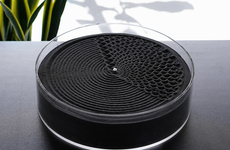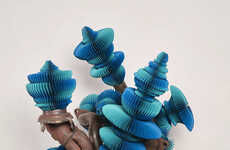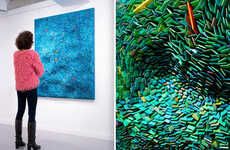
Motoi Yamamoto's Sustainable Labyrinths Are Incredible
Marissa Brassfield — March 23, 2009 — Art & Design
References: halsey.cofc.edu & treehugger
Motoi Yamamoto‘s incredible art uses salt, a compound that is essential to life. It’s no wonder that Yamamoto picked salt as his medium of choice; in Japanese culture, salt is not only a symbol of life, but purification. After losing his sister to brain cancer, salt seemed the ideal way for Yamamoto to purify his world and celebrate her life--as well as his own.
The images in the gallery above showcase the methodical nature that characterizes Motoi Yamamoto’s salt art. The first two images are part of an exhibition this month at Radium gallery in Tokyo; the remainder are from prior exhibitions.
The images in the gallery above showcase the methodical nature that characterizes Motoi Yamamoto’s salt art. The first two images are part of an exhibition this month at Radium gallery in Tokyo; the remainder are from prior exhibitions.
Trend Themes
1. Salt Art - Salt art is gaining popularity as an intricate and sustainable form of artistic expression.
2. Medium Choice - Choosing unconventional mediums, like salt, is a disruptive innovation opportunity in the art industry.
3. Symbolism and Purification - Exploring symbolism and purification in art offers a disruptive approach to engaging with audiences.
Industry Implications
1. Art - The art industry can benefit from embracing unconventional mediums and exploring deeper symbolism.
2. Exhibition - Exhibition spaces can attract new audiences and create memorable experiences through showcasing innovative salt art.
3. Wellness - The wellness industry can incorporate salt art as a form of therapeutic and meditative practice.
0.8
Score
Popularity
Activity
Freshness























